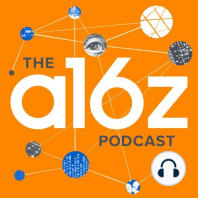31 min listen
Pandemics: Early Detection, Networks, Spreaders
Froma16z Podcast
ratings:
Length:
34 minutes
Released:
May 23, 2020
Format:
Podcast episode
Description
Pandemics are predictable; what's not predictable is the intensity, or the precise timing of arrival. That's where early detection -- not just rapid warning (as with something like Google Flu Trends back in the day), or even delayed warnings (as with CDC flu trackers and such) -- comes in. Because unfortunately, many disease tracking efforts old and new are "like watching the weather forecast a week after you've experienced that weather", observes a16z general partner Jorge Conde.And this matters for saving lives; for load balancing and allocating resources (ventilators, PPE, supplies); getting back to work; and much more. Even a two-week advantage could have made a huge difference! Which is what sociologist and physician Nicholas Christakis (who directs the Human Nature Lab, part of the Yale Institute for Network Science, and also author of the book Blueprint) learned from the H1N1 pandemic. Specifically, the role of social network "sensors" -- where friends in one's network graph can be like canaries in the proverbial coal mine to help detect pandemics earlier.In fact, the lab recently released an app called Hunala (which uses information crowdsourced among networks) to determine one's likelihood of contracting flu/ influenza-like or other respiratory illnesses through a personalized daily assessment of risk. Kind of like Waze, but for illnesses not car accidents. So in this episode of the a16z Podcast, the two take that analogy far. They also discuss the role of other mobility data and population flows in China for where and when the pandemic spread; the nuances behind "superspreaders"; how bad is the coronavirus, really; and the near future of "bio-surveillance" -- not just from a personal risk perspective, but from a global public-health perspective... Can we get the holy grail here without sacrificing privacy and agency?
Released:
May 23, 2020
Format:
Podcast episode
More Episodes from a16z Podcast
Next-Gen Gaming: AI Souls, Real-time Culture, Personalized Avatars: Over 3,700 companies applied to a16z’s SPEEDRUN. In this episode, we meet the founders pushing the boundaries of what games can be. From the fusion of traditional gaming elements with modern tech-twists, a16z General Partner Andrew Chen and Partner Josh Lu discuss the challenges and wins of creating games that are not only fun but also integrate seamlessly into the digital age, from AI-twins to games that “move at the speed of culture”. Whether you’re a developer, an enthusiast, or just curious about the future of interactive entertainment, this episode provides a glimpse into how today's creators use creativity and technology to captivate. by a16z Podcast
